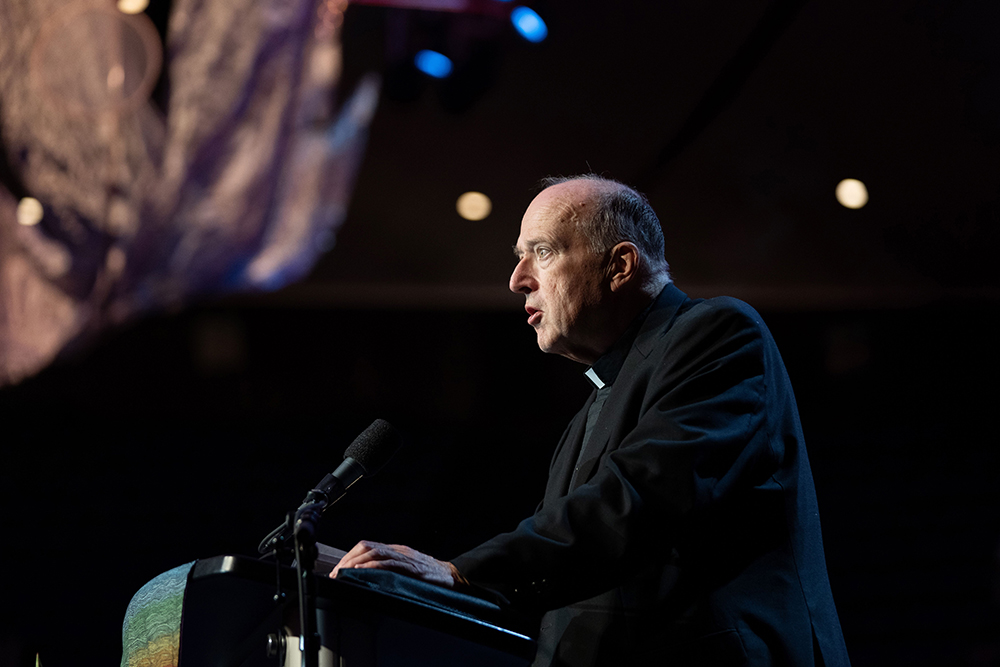The bishops are still in caucus this morning, but one issue remains central to all of their discussions: synods. Of all the initiatives that Pope Francis has initiated and that the U.S. Conference of Bishops has ignored, synods are the one that cannot be ignored.
While Laudato Si' was handed over to an outside body and Amoris Laetitia received no real attention from the bishops' conference, the latter has been invited to take part in the synodal process and it permeates nearly all of the discussions.
So while we wait for this afternoon's public session, I would like to discuss the keynote address that Cardinal Robert McElroy gave Monday at a meeting of the Catholic Health Association in San Diego, entitled “The Synod's Challenge to Catholic Health Care in the United States.”
McElroy began by outlining some of the general features of the synodal process and shared his specific thoughts from attending the synodal general assembly held in Rome last October. He then outlined four fundamental questions about the synodal process that Catholic health care professionals should ponder. While this overview deals with health care, he also indicated how the process can be applied to other areas of clergy and church life.
The first question the Cardinal posed was how to generate and deepen “an analogical mode of discernment at all levels, rooted in authentic listening, recognizing the presence of God and listening with deep respect to the voice of the other.” [making] “Everyone can feel accepted and respected,” he said. The Catholic Health Association has a “head start” in this regard because its ministries are rooted in sacred religious life, but the constraints of the surrounding culture and economic headwinds mean such discernment will require “great effort, commitment and conversion,” he noted. It is easy to see how this insight applies to other ministries of the Church.
The second question was a much trickier one: “How should the Church's doctrinal tradition and history shape its ability to refine its teaching when faced with a world in which life itself is evolving in significant ways and in some matters revealing that the understanding of human nature and moral reality on which previous doctrinal pronouncements were based is in fact very limited or time-bound?” This was a call for a renewal of moral theology, and the cardinal cited Pope Francis' doctrine “Ad Theologiam Promovendam” and its call to embrace a more inductive theological approach as pointing the way forward. McElroy noted that health professionals must bring their insights and experiences to bear on the renewal of Catholic moral theology.
The third question was how to “embody the pastoral position of Jesus Christ,” citing a Synod document that states, “In the Gospels, Jesus encounters people in the uniqueness of their personal stories and situations. He does not start from the standpoint of prejudice or labels, but from the authenticity of a relationship in which one is truly committed, even at the cost of experiencing rejection.”The cardinal noted how difficult it can be to take the time to embody this pastoral dimension in one's work, given the “highly competitive” environment of Catholic health care.
He didn’t mention it, but I will: Time spent in chaplaincy care, treating patients as people, is not “billable,” at least not in this life and profit-driven health care system.
The last question checks the second question: “How should the Church's health ministry be a countercultural force in American society today?” McElroy said that in part, “this countercultural witness is to help society answer the crucial questions of moral choice, the allocation of social resources, and the purpose of health care in light of a Catholic understanding of human dignity and resurrection.” It also entails serving “those in our society whom our culture ignores and discards: the poor, the undocumented, the unborn, the mentally ill.” Catholic health ministries have an obligation to “remain faithful to the Gospel of Jesus Christ and the teachings of the Church by taking positions rejected by both polar cultures that divide the country on issues of end of life, gender identity, and the role of technology in health care and science.”
McElroy's talk made clear the need to address these difficult questions and grapple with the competing elements of priesthood, which is always applied, defined in part by the needs of those to whom it is addressed, but rooted in those to whom it is performed. While priesthood inevitably involves tensions, the cardinal suggested that the synodal approach the Pope has called for the Church could be particularly helpful for Catholic health clergy, who are often on the front lines of the culture wars.
These tensions are present in all of the Church's ministries. The needs of a homeless drug addict must be met, but we cannot encourage their addiction. Regardless of one's views on the legitimacy of war, the spiritual needs of men and women in the military must be attended to. Concern for the natural environment in an age of climate crisis does not mean ignoring the needs of those toiling in extractive industries while pursuing a just transition to a zero-carbon future. We can only rise to these challenges if we listen to the Holy Spirit. That attentiveness is rooted in Scripture and the teaching of the Church, but it must also include patiently listening to God's people as the Holy Spirit speaks to them.
McElroy's speech speaks to the challenge facing this deeply divided bishops' conference: they cannot be united by their own wisdom alone. Only with the grace of the divine wisdom that the synod invites can our bishops find a way to lead the Church through the culture wars of our time.



